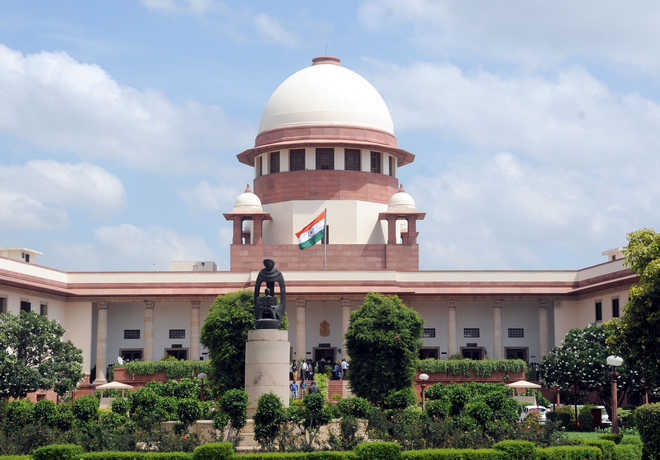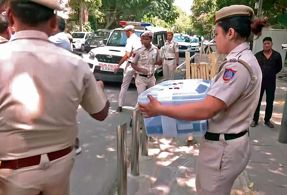
Key question: The issue at the heart of the contempt law is whether judges are special or is justice special. PTI
Karan Thapar
Senior Journalist
If it wasn’t disturbing, it might be funny. Late Tuesday evening, the Supreme Court announced it had suo motu registered a criminal contempt case against Rajdeep Sardesai for two tweets last August. Although Attorney General KV Venugopal had earlier refused consent, the court, it seemed, was exercising its right to take cognisance. Hours later, the court’s registry clarified this was “an inadvertent mistake”.
I would say the issue at the heart of the law of contempt is a simple and straightforward one. Are judges special or is justice special? It’s an interesting question and not because it’s a tricky one.
Let’s examine it in the light of two cases where charges of contempt have been filed and are being heard — the case of comedian Kunal Kamra and that of cartoonist Rachita Taneja. I’ll give you the details so you can judge for yourself whether they amount to contempt, satire or humour.
In Kamra’s case, it was a matter of two tweets and a gesture. The first tweet said: “Honour has left the building (Supreme Court) long back”. The second said: “The Supreme Court of this country is the most supreme joke of this country.” Do these tweets really amount to contempt or are they better understood as satire or even a reflection of what the Indian public thinks?
The gesture is more tricky. It’s both clever and questionable. At one level, the raised index and middle finger of Kamra’s left hand is a V-signal. However, the accompanying message could convert this into a rude gesture. Actually, crude might be a better word. But is that contempt? Even if it is, it’s too immature to be taken seriously. Judges — and not just because of their age — should rise above it.
Let’s now turn to Kamra’s defence. “I believe that constitutional offices — including the judicial offices — know no protection from jokes”. But he goes further… “jokes are not reality and don’t claim to be so.” And then tellingly, adds: “Just as the Supreme Court values the faith public places in it, it should also trust the public not to form its opinion of the court on the basis of a few jokes on Twitter.”
This is what former Attorney General Mukul Rohatgi said to me in a recent interview: “I don’t think it’s contempt… the tweets of Mr Kamra may be in bad taste but they are not contempt…people are entitled to speak their mind… we should shrug our shoulders and move away. These things happen but move on.”
The other case concerns two cartoons by Rachita Taneja. In one, a figure with a mike says to the Supreme Court, whilst the BJP looks on, “Tu jaanta nahi mera baap kaun hai.” In the other, there’s a drawing of the Supreme Court with an orange flag and the caption says, “Sanghi Court of India”. Is that contempt or satire or criticism?
I haven’t seen Taneja’s defence, but let me quote Mukul Rohatgi’s opinion. These cartoons are “definitely not contempt but satire”. He said: “The Attorney General should not have granted permission (for prosecution)… by taking notice of these matters, you are giving importance to something that doesn’t deserve it.”
Now let’s return to the question I started with: Are judges special or is justice special? I would venture to suggest Kamra’s and Taneja’s fate depends on how the Supreme Court answers this question. Obviously, I don’t know but I can tell you how the concept of contempt has evolved in Britain, where it originated, and how British judges view it today.
The concept is centuries-old British law abolished in 2013. At the time, the British Law Commission said the purpose was not just “preventing the public from getting the wrong idea of judges…but where there are shortcomings, it’s equally important to prevent the public from getting the right idea.” In other words, one intention was to hide judicial corruption. The concept, therefore, clashed with the need for transparency but also freedom of speech.
As far back as 1968, Lord Denning, Britain’s former Master of the Rolls, had this to say of the Law of Contempt: “Let me say at once that we will never use this jurisdiction as a means to uphold our own dignity…nor will we use it to suppress those who speak against us. We do not fear criticism, nor do we resent it. For, there is something far more important at stake. It is no less than freedom of speech itself. It’s the right of every man, in parliament or out of it, in the press or over the broadcast, to make fair comment, even outspoken comment, on matters of public interest… we must rely on our own conduct itself to be its own vindication.”
In 1987, after the Spycatcher judgment, when the Daily Mirror called British Law Lords ‘You Old Fools’, or in 2016, after the Brexit ruling, when the Daily Mail called three judges ‘Enemies of the people’, the British judiciary consciously and sensibly ignored the headlines and did not consider contempt prosecution. In fact, Lord Templeton’s comment on the Spycatcher headline is worth recalling: “I cannot deny that I am old; it’s the truth. Whether I am a fool or not is a matter of perception of someone else…there is no need to invoke the powers of contempt.”
A similar position was adopted in a 2008 lecture by our own Justice Markandey Katju: “If a person calls me a fool, whether inside court or outside it, I for one would not take action as it does not prevent me from functioning, and I would simply ignore the comment or else say that everyone is entitled to his opinion. After all, words break no bones.”
More importantly, Justice Katju added: “The test to determine whether an act amounts to contempt of court or not is this: does it make the functioning of judges impossible or extremely difficult? If it does not, then it does not amount to contempt of court even if it's harsh criticism …the only situation where I would have to take some action was if my functioning as a judge was made impossible…after all, I have to function if I wish to justify my salary.”
I think that answers the question I began with. Whilst justice is important, judges must not take themselves too seriously. Even if their amour propre is offended, it does not mean the institution has been questioned or justice brought into disrepute. Judges deliver justice, they do not embody it. They should never forget that their court is supreme because it’s final, not because it’s infallible. When it’s their lapse, they can be criticised, but of course, politely and fairly.
Join Whatsapp Channel of The Tribune for latest updates.




























